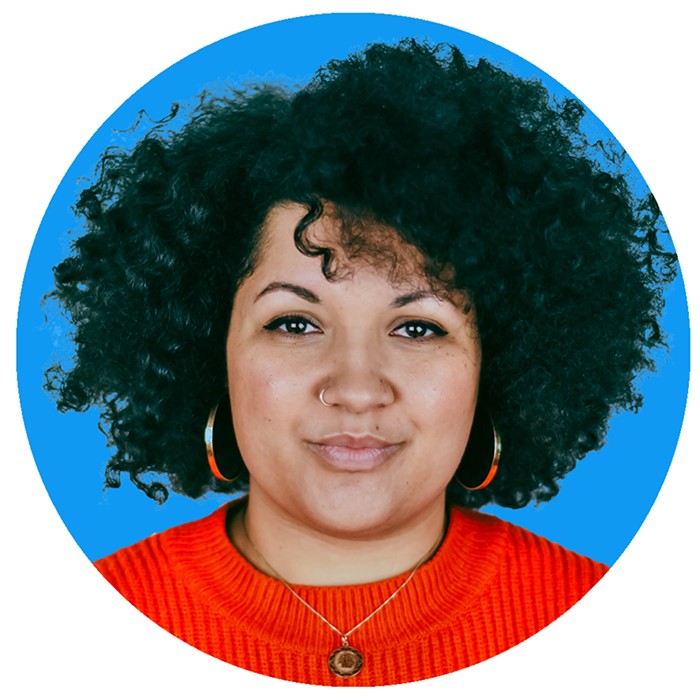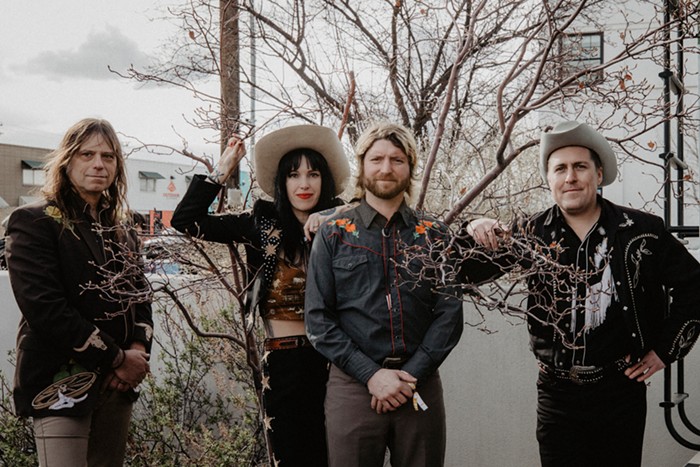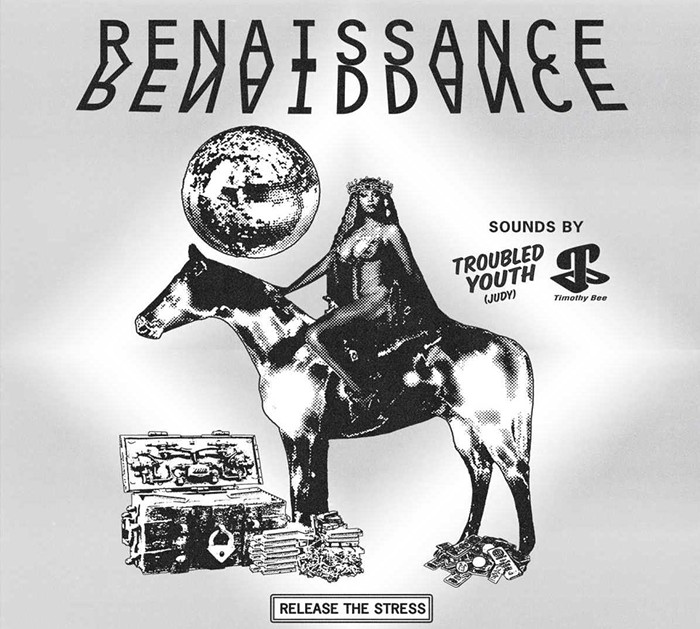
Born-and-raised Portlander Moorea Masa had been wanting to move to Los Angeles since before the COVID-19 pandemic rocked the United States—but once COVID hit, she initially thought she and her partner would have to put her move on hold.
“And then this really, really amazing spot opened up,” she says via phone, while driving to her home in LA traffic. Masa says she connected with Raquel Rodriguez of the distinguished Blue Dream Studios and became part of a community of working musicians in the View Park neighborhood. “We just came here to be a part of the community and be in the sunshine a little bit. Sorry, I love you, Portland, but I cannot do a winter like locked away,” Masa says of the 2020 move.
Moorea Masa and the Mood is what she calls her band of support, whoever that may involve at the time—the ones helping her set the mood. "I had a pretty solid band that I had been working with for years and years in Portland. And my drummer, Micah Hummel, was on a lot of my record. Now the mood is like my friends in LA, so it's been like, you know, whoever is free?," she says with a laugh.
The singer-songwriter wrote her latest project, Heart in the Wild: Side A, with her partner Steve Watkins, along with another musician couple: singer Jess Best and engineer Connor Shultze. “Jess is an artist and I met [her and Connor ] in New York and then I just invited them to Portland,” she explains. Since Moorea Masa had a studio in the Falcon Arts building in North Portland at the time, “we literally just locked ourselves in the studio and would make breakfast, go there in the morning and I’d come home at like one in the morning,” she says.
Released on April 30, Heart in the Wild: Side A is about Moorea Masa’s complicated relationship with her estranged mother, a Black queer woman who suffers from debilitating mental illness.
“For a long time I've wanted to write about my mom and I just wasn't quite ready. In the last couple of years I've had to completely cut contact with her for my physical safety,” says the singer. In the last two years Masa has finally been able to write about the relationship, and the process has been healing for her. “It's also been really hard," she says. "I feel like in the time where I was writing, I was just really diving into these things, [and it] isn't easy to just sit with those feelings and really go deep into them." Masa says it's also been hard and a little scary to release the record in general. "I feel like it's super vulnerable to put that stuff out there and just be like, ‘Okay, I'm going to put my most intimate fears and feelings out into the world,’” she says, adding “but, you know, it has been really beautiful.”
Additionally, Masa says “It's been really cool to get messages [of the project] impacting other people who are like, ‘I have had a similar experience, and this is how your music impacted me.’"
"When we are able to talk about mental illness, when we’re able to talk about our experiences, our heartache, it just makes it easier," she adds. "It's like we’re not all having to hold it on our own and it also takes away a lot of our shame... that is really healing for me to just be able to share that with other people; I'm helping somebody else feel less alone. And that is really important to me. It's the reason why I bare my soul.”
There are three music videos from the project, giving visuals to some of its greatest highlights—the catchy song “Honey,” “Until Then”—which explores her feelings of grief and acceptance as she comes to terms with the current state of her relationship with her mom—and most recently "Lion."
“‘Honey,’ was this crew of women, it was like all BIPOC, all queer, all incredible, fucking badass women," she says. In addition to helping her create the visuals for "Until Then," local soul singer/songwriter/farmer/creative director Blossom directed Moorea Masa’s music video for “Honey”—her first time directing another artist’s visual project. "[During] quarantine, it was like ‘let's make some art, too, ’cause we were really craving it, and Blossom helped me with my “Until Then” video. And then a couple of the same women helped me with the ‘Lion’ video.” Masa also credits her friend Zandi for the beauty and execution of most of her music videos.
Her new video for her single “Lion” sees her singing about the protection type of love she’s always wanted from her mom by leaning on that current support system of queer women of color and bonding over shared experiences. “I really had an incredible support system of BIPOC women who are just really validating and can hold space for all of it and that has been like deeply healing.” That includes Blossom, whose mother passed away a year ago. “Without speaking on her situation, we have a lot of similarities with our moms and we've just really connected on such a deep level with our experience," says Masa. "It's been really meaningful to make all this art with her about my mom, and I feel like she can relate. Yeah, it's been really, really beautiful to like, share that with her.”
While Moorea Masa is white-passing, she says that with the help of her support system, she has also finally begun to step into her identity as mixed as of late.
“Blossom, the first time she heard my mom was Black, she was like, ‘Okay, listen up. I'm going to need you to get really clear on your identity. You are a Black woman.’ She was basically just like, ‘You need to own this and like we can talk about this any time, but like, how come I never heard about this before?’ And I was like ‘I just always felt like I don't want to take up the space.’” Masa says.
“I do identify as being mixed and…. I've always just said, ‘I have a Black mom’ and that's because I'm very white passing. And I know I don't have the same experience that people with darker skin have or even my mom," Masa says, adding that while her own mother definitely looks Black, she is also lighter in complexion. "So I do identify as mixed, and that's taken me a minute to come to, because I felt like I don't want to take up this space from other folks who have harder experiences than me," she explains. "But I feel like I've come to this place where I'm like, ‘no, I am actually. I am mixed. This is my actual heritage. This is actually the space that I belong,'" Masa says, adding that she thinks it's important for white people and everyone to know that Blackness is not a monolith.
"We all have different experiences. We come in a variety of shades," she says. "I can use that privilege of being able to pass to uplift folks with different experiences than me. And I feel like I can be a bridge builder and that has felt really good to me."
Masa often wonders how her mother would be doing if she had the privilege of mental health resources and a support system to help her. That's why Masa has been making efforts to raise awareness about mental illness, and give back to the community that has nurtured her own growth. For a recent virtual single release party, Masa joined forces with Musicians in Solidarity—a local organization that strives to introduce diversity training to music venues—to raise funds for Radical Rest, another local organization offering complementary wellness services for BIPOC community members. She also donated the first $500 in sales from "Honey" to an organization in support of Black Lives Matter.
While there's no exact date yet, Masa says Heart in the Wild: Side B will be out sometime this summer.



















